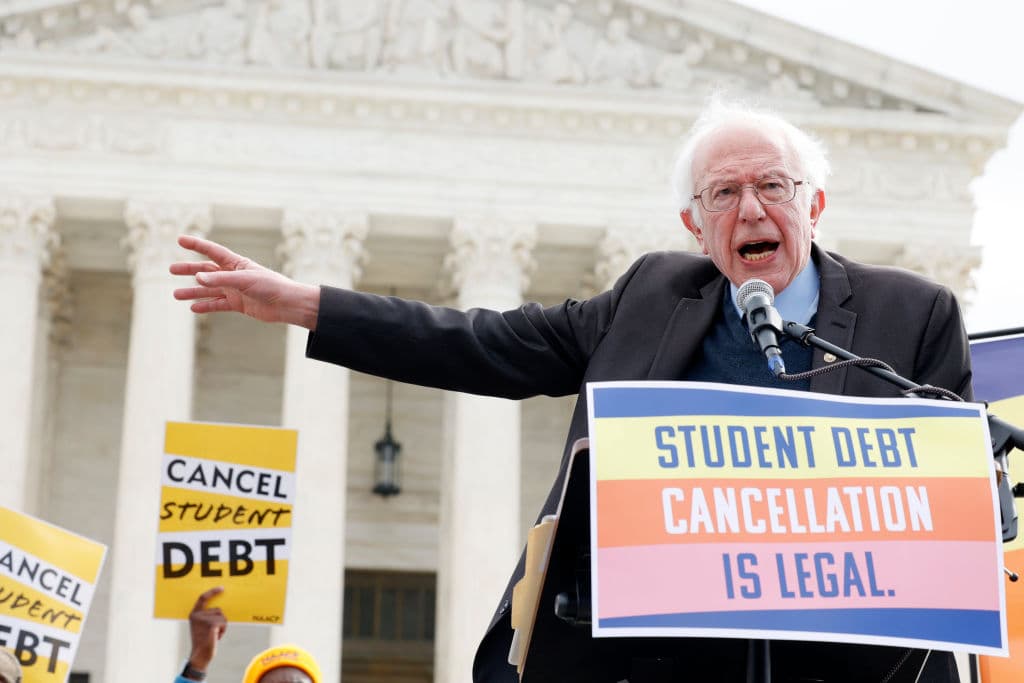Would Biden Defy the Supreme Court on Student Loan Forgiveness?
Activists in favor of canceling loan obligations want the president to do whatever it takes.

Count on the Democrats’ turn to outright defiance in the event that the Supreme Court refuses to allow President Biden’s constitutionally dubious student loan forgiveness scheme. “Failure isn’t an option,” is how one liberal activist puts it in a report in Bloomberg News. He’s referring to the left’s demands that the White House find another legal justification for the loan writeoff if the Supreme Court rules against the Biden plan.
Even without the talk of defying the high court, the student loan forgiveness dispute, Biden v. Nebraska, could prove to be the most consequential case of the term, in that it weighs a blatant case of overreach by the executive. Mr. Biden’s loan scheme is, itself, a usurpation of Congress’ power of the purse. That’s one breach of the Constitution’s separated powers. If the president circumvents a Judicial branch ruling against him, it would mark a second.
The loan amnesty plan, announced in the leadup to the midterms and designed to help Democratic prospects among young voters more likely to carry student debt, relies on a 2003 law, the so-called “HEROES Act.” That measure allows the Education Department “to alleviate the hardship that federal student loan recipients may suffer as a result of national emergencies.” The Covid epidemic was cited as the basis for the Biden amnesty.
It’s far from clear, though, that this law gives the president any authority to forgive debts. The legislation speaks of waiving or modifying provisions of the student loan program, not of writing off debts outright. We’re accustomed to Democrats enacting welfare programs to aid constituents. Mr. Biden’s scheme takes this to a new level, attempting by executive action alone to hand money — up to $20,000 — to individual voters.
Putting aside the ethical qualms about vote-buying in the Biden scheme, it’s also poor policy. If allowed to go through, the plan would fuel only more student debt — already $1.75 trillion. We’re not the only ones to have noted, too, the scandal of taking tax dollars from all Americans to help the fraction who borrowed money to pay for a college degree. These loans, guaranteed by Uncle Sam, were taken out by strivers who pledged to repay them.
One doesn’t hear much about that obligation in the press. The AP frames the amnesty as a matter of racial justice. The prospect of the high court rejecting the Biden plan reflects, the AP reports, “a larger backlash to racial progress in higher education.” One Black student, working as a “community organizer,” tells the AP that “from a pandemic, an uprising, a recession, the cost of living price going up. I deserved some relief.”
An official of the National Association for the Advancement of Colored People, Wisdom Cole, adds that “a generation of young voters of color” took Mr. Biden “at his word when he promised to cancel debt.” He is among those urging the president to forgive student loans, even if it means defying the high court. The co-founder of the activist Debt Collective wants Mr. Biden to rely on the 1965 Higher Education Act as a fallback option.
The problem, frets a Fordham Law professor, Jed Shugerman, is that using the education act could drag out the amnesty past the 2024 election. For activists, what else is the point? Liberal groups like the Progressive Change Campaign Committee are among those standing at the “ready to bombard the White House” with phone calls and e-mails urging Mr. Biden to act if the court rules against him, Bloomberg reports.
Liberals in the Congress, like Senator Sanders, are also muttering about acting in defiance of the high court on the loan amnesty. “It’s an issue we’re going to deal with, aggressively,” the Vermont Socialist says. This kind of talk, coming at a time when the left is raising doubts about the “legitimacy” of the high court — and the personal ethics of the justices themselves — adds to the gravity of what is shaping up as a dangerous moment for the Constitution.

